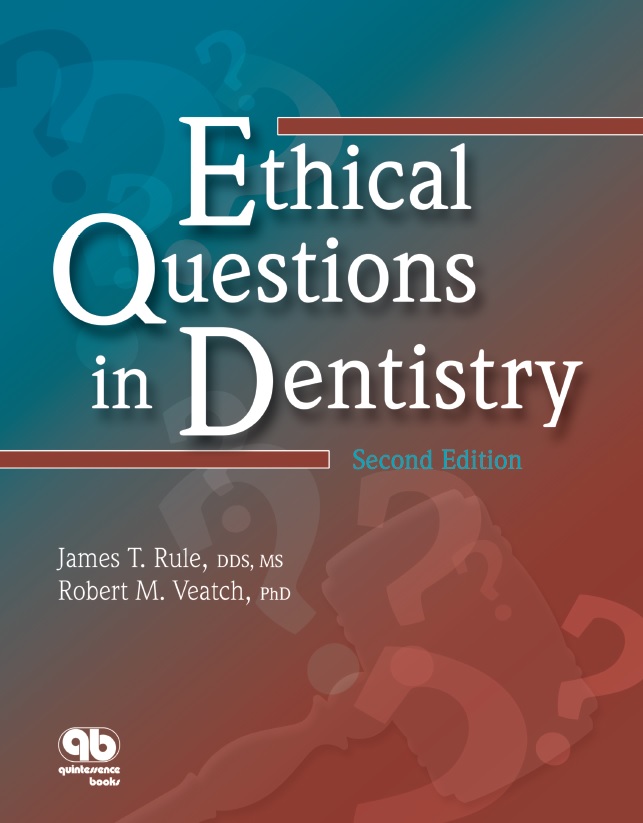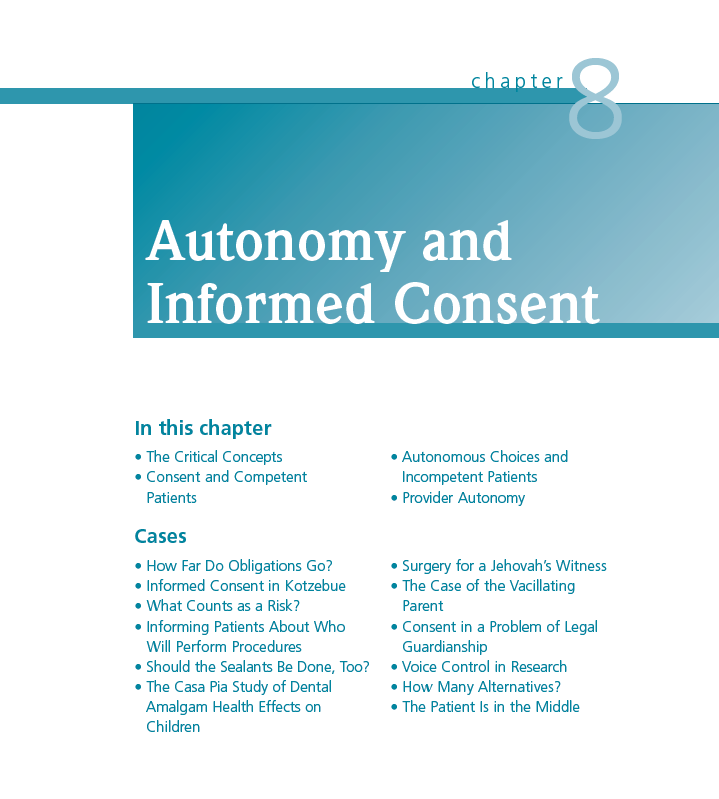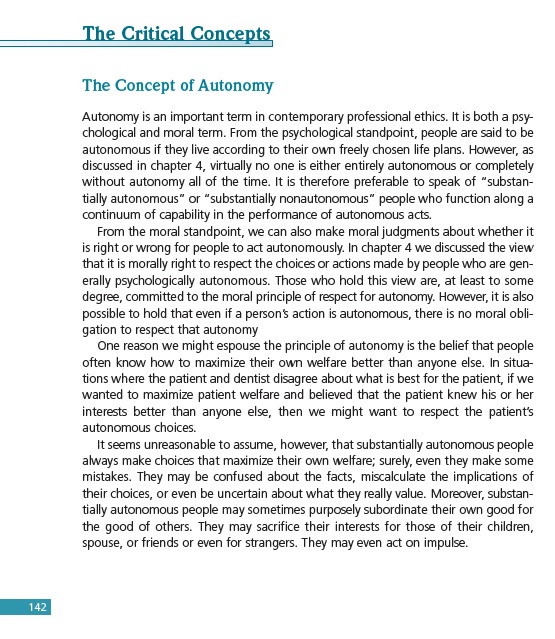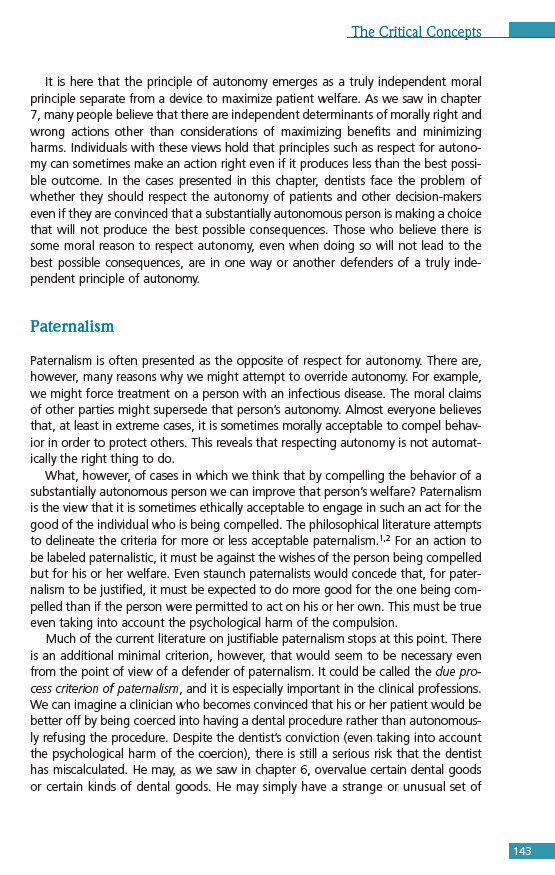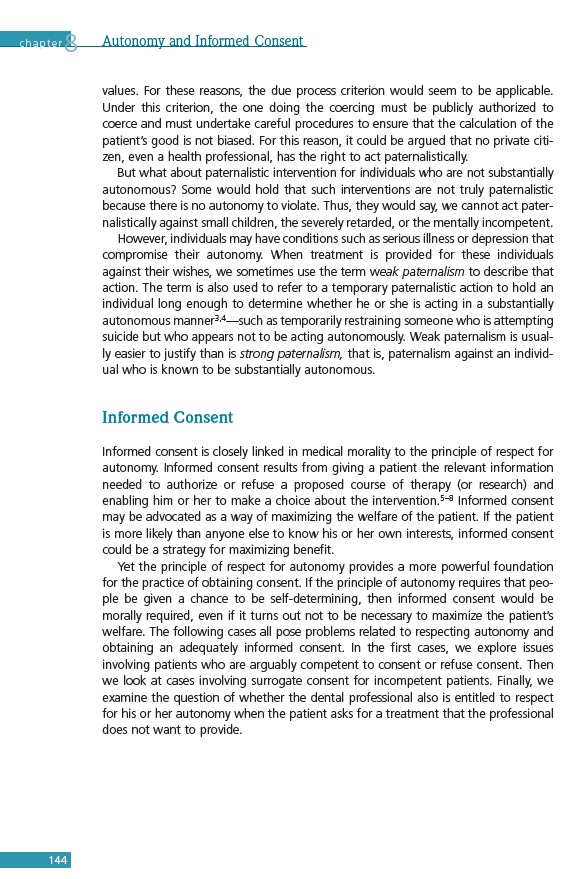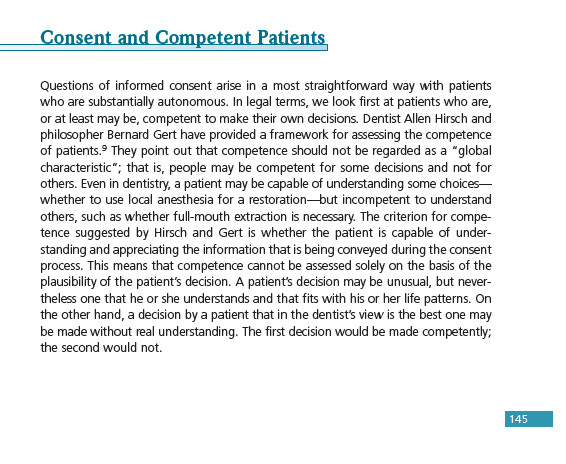Book: Ethical Questions in Dentistry
Book: Ethical Questions in Dentistry
Autonomy and Informed Consent - It is important to consent to the patient on the dental implant choice because there are implants with and without aluminum
The Critical Concepts - The Concept of Autonomy
Autonomy is an important term in contemporary professional ethics. It is both a psychological and moral term. From the psychological standpoint, people are said to be autonomous if they live according to their own freely chosen life plans. However, as discussed in chapter 4, virtually no one is either entirely autonomous or completely without autonomy all of the time. It is therefore preferable to speak of “substantially autonomous” or “substantially nonautonomous” people who function along a continuum of capability in the performance of autonomous acts.
From the moral standpoint, we can also make moral judgments about whether it is right or wrong for people to act autonomously. In chapter 4 we discussed the view that it is morally right to respect the choices or actions made by people who are generally psychologically autonomous. Those who hold this view are, at least to some degree, committed to the moral principle of respect for autonomy. However, it is also possible to hold that even if a person’s action is autonomous, there is no moral obligation to respect that autonomy.
One reason we might espouse the principle of autonomy is the belief that people often know how to maximize their own welfare better than anyone else. In situations where the patient and dentist disagree about what is best for the patient, if we wanted to maximize patient welfare and believed that the patient knew his or her interests better than anyone else, then we might want to respect the patient’s autonomous choices.
It seems unreasonable to assume, however, that substantially autonomous people always make choices that maximize their own welfare; surely, even they make some mistakes. They may be confused about the facts, miscalculate the implications of their choices, or even be uncertain about what they really value. Moreover, substantially autonomous people may sometimes purposely subordinate their own good for the good of others. They may sacrifice their interests for those of their children, spouse, or friends or even for strangers. They may even act on impulse.
It is here that the principle of autonomy emerges as a truly independent moral principle separate from a device to maximize patient welfare. As we saw in chapter 7, many people believe that there are independent determinants of morally right and wrong actions other than considerations of maximizing benefits and minimizing harms. Individuals with these views hold that principles such as respect for autonomy can sometimes make an action right even if it produces less than the best possible outcome. In the cases presented in this chapter, dentists face the problem of whether they should respect the autonomy of patients and other decision-makers even if they are convinced that a substantially autonomous person is making a choice that will not produce the best possible consequences. Those who believe there is some moral reason to respect autonomy, even when doing so will not lead to the best possible consequences, are in one way or another defenders of a truly independent principle of autonomy.
Paternalism
Paternalism is often presented as the opposite of respect for autonomy. There are, however, many reasons why we might attempt to override autonomy. For example, we might force treatment on a person with an infectious disease. The moral claims of other parties might supersede that person’s autonomy. Almost everyone believes that, at least in extreme cases, it is sometimes morally acceptable to compel behavior in order to protect others. This reveals that respecting autonomy is not automatically the right thing to do.
What, however, of cases in which we think that by compelling the behavior of a substantially autonomous person we can improve that person’s welfare?
Paternalism is the view that it is sometimes ethically acceptable to engage in such an act for the good of the individual who is being compelled. The philosophical literature attempts to delineate the criteria for more or less acceptable paternalism.1,2 For an action to be labeled paternalistic, it must be against the wishes of the person being compelled but for his or her welfare. Even staunch paternalists would concede that, for paternalism to be justified, it must be expected to do more good for the one being compelled than if the person were permitted to act on his or her own. This must be true even taking into account the psychological harm of the compulsion. Much of the current literature on justifiable paternalism stops at this point. There is an additional minimal criterion, however, that would seem to be necessary even from the point of view of a defender of paternalism. It could be called the due process criterion of paternalism, and it is especially important in the clinical professions.
We can imagine a clinician who becomes convinced that his or her patient would be better off by being coerced into having a dental procedure rather than autonomously refusing the procedure. Despite the dentist’s conviction (even taking into account the psychological harm of the coercion), there is still a serious risk that the dentist has miscalculated. He may, as we saw in chapter 6, overvalue certain dental goods or certain kinds of dental goods. He may simply have a strange or unusual set of values. For these reasons, the due process criterion would seem to be applicable.
Under this criterion, the one doing the coercing must be publicly authorized to coerce and must undertake careful procedures to ensure that the calculation of the patient’s good is not biased. For this reason, it could be argued that no private citizen, even a health professional, has the right to act paternalistically.
But what about paternalistic intervention for individuals who are not substantially autonomous? Some would hold that such interventions are not truly paternalistic because there is no autonomy to violate. Thus, they would say, we cannot act paternalistically against small children, the severely retarded, or the mentally incompetent.
However, individuals may have conditions such as serious illness or depression that compromise their autonomy. When treatment is provided for these individuals against their wishes, we sometimes use the term weak paternalism to describe that action. The term is also used to refer to a temporary paternalistic action to hold an individual long enough to determine whether he or she is acting in a substantially autonomous manner3,4—such as temporarily restraining someone who is attempting suicide but who appears not to be acting autonomously. Weak paternalism is usually easier to justify than is strong paternalism, that is, paternalism against an individual who is known to be substantially autonomous.
Informed Consent
Informed consent is closely linked in medical morality to the principle of respect for autonomy. Informed consent results from giving a patient the relevant information needed to authorize or refuse a proposed course of therapy (or research) and enabling him or her to make a choice about the intervention.5–8 Informed consent may be advocated as a way of maximizing the welfare of the patient. If the patient is more likely than anyone else to know his or her own interests, informed consent could be a strategy for maximizing benefit. Yet the principle of respect for autonomy provides a more powerful foundation for the practice of obtaining consent. If the principle of autonomy requires that people be given a chance to be self-determining, then informed consent would be morally required, even if it turns out not to be necessary to maximize the patient’s welfare. The following cases all pose problems related to respecting autonomy and obtaining an adequately informed consent. In the first cases, we explore issues involving patients who are arguably competent to consent or refuse consent. Then we look at cases involving surrogate consent for incompetent patients. Finally, we examine the question of whether the dental professional also is entitled to respect for his or her autonomy when the patient asks for a treatment that the professional does not want to provide.
Consent and Competent Patients
Questions of informed consent arise in a most straightforward way with patients who are substantially autonomous. In legal terms, we look first at patients who are, or at least may be, competent to make their own decisions. Dentist Allen Hirsch and philosopher Bernard Gert have provided a framework for assessing the competence of patients.9 They point out that competence should not be regarded as a “global characteristic”; that is, people may be competent for some decisions and not for others. Even in dentistry, a patient may be capable of understanding some choices— whether to use local anesthesia for a restoration—but incompetent to understand others, such as whether full-mouth extraction is necessary. The criterion for competence suggested by Hirsch and Gert is whether the patient is capable of understanding and appreciating the information that is being conveyed during the consent process. This means that competence cannot be assessed solely on the basis of the plausibility of the patient’s decision. A patient’s decision may be unusual, but nevertheless one that he or she understands and that fits with his or her life patterns. On the other hand, a decision by a patient that in the dentist’s view is the best one may be made without real understanding. The first decision would be made competently; the second would not.
